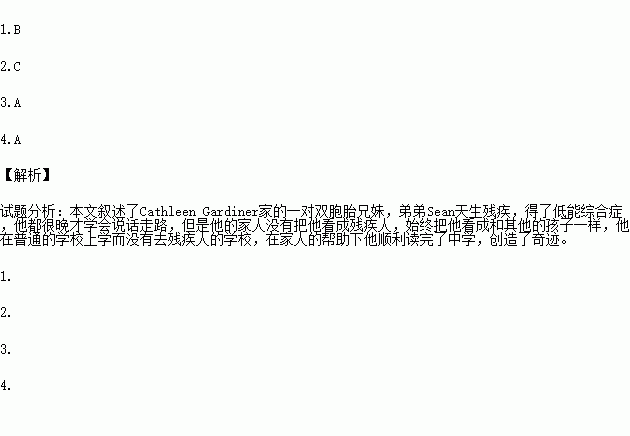题目内容
When Cathleen Gardiner’s twins were born 17 years ago, doctors told her that they were a pair in a million. One had Down syndrome(低能综合症), while the other did not. Here, Cathleen tells their touching story.
Since Sean was born 17 years ago, I have always thought that he is just as wonderful as his brother and sister. Though he had a disability(残疾), we have never viewed him as a burden. He has always been a blessing. The doctors explained that though they were twins, they came from two different eggs. Lisa could walk at 11 months old, while Sean didn’t take his first steps till he w as three. By two, Lisa was talking a lot, but Sean wasn’t able to speak until he was nearly four.
For the first five years of his life, Sean needed a great deal of care. Looking after him was my full-time job, though I also worked as a technical adviser in a computing company. We never treated them differently. We gave them the same toys and spoke to them in the same way. We encouraged Sean to keep up with Lisa, even though he never could, and we would help him develop his abilities. We sent them to the same primary school even after doctors advised us that Sean should go to a school for the disabled.
We had to explain to Lisa that he wouldn’t learn as quickly as she would. She told us that she’d help him with his school work. Having a non-disabled twin has really helped Sean develop. The love they share has given him a great deal of support. Now Sean and Lisa are both about to finish high school. I don’t think he would have done nearly as well today without Lisa’s help.
1.At least how many children does Mrs. Gardiner have?
A. Two. B. Three. C. Four. D. One.
2.Mrs. Gardiner and her husband regarded Sean as _______.
A. a boy making others touched
B. a normal child without disabilities
C. a special gift
D. a burden of their family
3.The third paragraph mainly tells us that _______.
A. the couple treated the twins equally
B. Cathleen did all she could to look after Sean
C. the couple didn’t follow the doctor’s advice
D. the couple encouraged Sean to grow up
4.This passage tells us that _________.
A. love can do wonders
B. nobody is foolish or clever
C. being stupid doesn’t matter
D. all men are born equal


 d blinded them to the need for change. Finally, after butting heads with several senior executives (主管) many times, she left the company. But she found that she hadn’t left her resentment, frustration, and anger behind when she resigned.
d blinded them to the need for change. Finally, after butting heads with several senior executives (主管) many times, she left the company. But she found that she hadn’t left her resentment, frustration, and anger behind when she resigned.